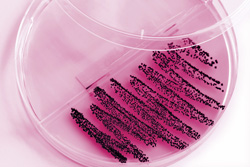Biocides and antibiotic resistance
Rising antibiotic resistance in pathogenic bacteria presents a serious obstacle for the effective treatment of infectious diseases. Evidence from various studies on antibiotic resistance raises the possibility that mutants showing low susceptibility to biocides also have reduced susceptibility to antibiotics. The EU-funded 'Confronting the clinical relevance of biocide induced antibiotic resistance' (BIOHYPO) project investigated the association between widespread biocide use and antibiotic resistance in human pathogens. For this purpose, four biocides were tested on human pathogens — benzalkonium chloride, chlorhexidine, triclosan and sodium hypochlorite. This would help determine the biocide ecological cut offs (ECOFFs) values — minimal bacteriostatic concentration (MIC) and minimal bactericidal concentration (MBC). These ECOFFs are freely available on the project website and can be used to determine which microbes are less susceptible to certain biocides. Research on biocide resistance mechanisms revealed two novel pathways in Staphylococcus aureus that are associated with triclosan-resistance. In gram-negative bacteria and Candida pathogens, biocide resistance was associated with over-expression of certain efflux systems. Partners found no significant correlation between reduced susceptibility of pathogens to biocides and antibiotic resistance except in the case of chlorhexidine and benzalkonium chloride. However, partners fear that this may change in the future. Type I integrons were found in several human pathogens carrying the genes ( qacA and S. haemolyticus(sh)-fabI allele) associated with increased biocide and antibiotic resistance. Combined with novel methods for determining biocide activity and measuring resistance, the BIOHYPO-generated information has important clinical implications. Research outcomes should help decision-makers formulate appropriate intervention measures that limit the future impact of biocides on the emergence of antibiotic resistance.

